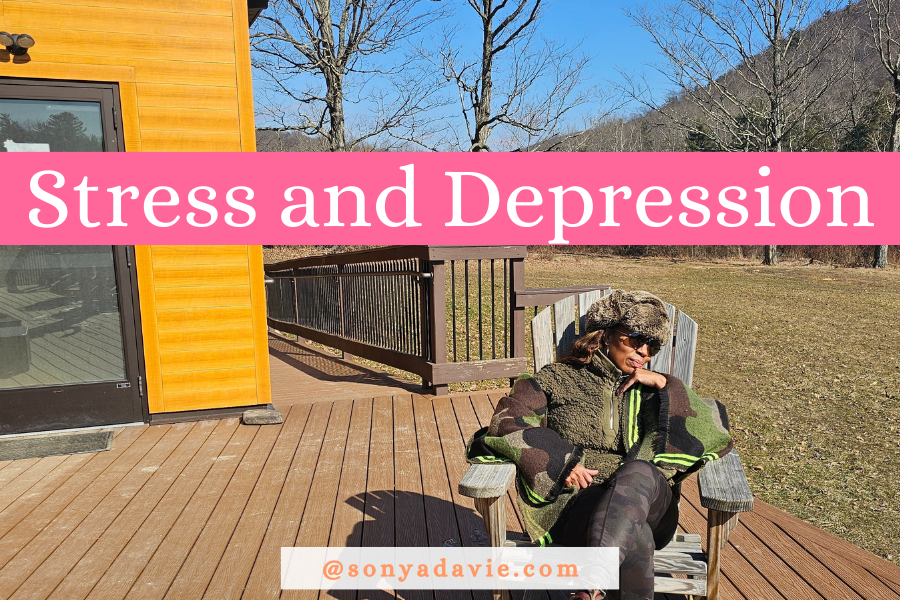Your mental health matters!
May is Mental Health Awareness Month, a cause that’s close to my heart.
This month, I’m deeply committed to amplifying the voices of those dealing with mental health challenges and sharing resources to support those struggling.
So.. let’s get started.
In this blog, let’s dig into the strong connection between stress and depression. And let’s also talk about the approaches to managing these conditions.

This post is all about stress and depression.
The Inescapable Duo: Stress and Depression
Traditionally, depression has been viewed as a chemical imbalance in the brain. However, recent research suggests a different perspective.
A review by psychiatrist Joanna Moncrieff and her co-researchers argues that social and environmental factors play a more prominent role in depression than previously thought. They propose that depression may be a “normal brain responding to stress or adversity,” rather than solely a brain disorder. (Source)
“There is abundant evidence that it is the context of our lives and not the balance of our chemicals that offer the most insight into depression.” – Moncrieff et al. (Source)
This means that… difficult life situations are more likely to explain depression than problems within the brain itself.
Beyond the Brain: The Role of Social and Environmental Factors
Pic: Mental health is not simply a matter of brain chemistry. Our social environment and life experiences play a crucial role in shaping our emotional well-being.
This finding aligns with the observation that overwhelming pains – financial hardship, childhood trauma, relationship problems, and significant losses – often precede depression.
As Dr. James M. Greenblatt states in his book “Integrative Medicine for Depression: A Breakthrough Treatment Plan that Eliminates Depression Naturally,” overwhelming pains are consistently associated with depression, and a more sensible model would take this cause-and-effect relationship into account. (Link to Book)
When these challenges are not effectively addressed, they can lead to chronic stress, a significant risk factor for depression.
Chronic stress from these situations can lead to a vicious cycle, where depression and immobilization create further stress and pain.
Anti-Depressant Medication Not Working?
The effectiveness of antidepressant medication has come under scrutiny in recent years, with psychiatrist Joanna Moncrieff challenging its efficacy in a 2001 paper.
Moncrieff’s assertion was clear: despite the escalating use of antidepressants, there is no substantial evidence to suggest that they are effectively reducing the burden of depressive disorders.
Fast forward nearly two decades after, her observations remain TRUE.
Despite the growing number of individuals diagnosed with depression and prescribed antidepressants, there has been little improvement in the overall mental health landscape.
This raises significant questions about the reliance on medication as the primary approach to treating depression.
Rethinking Your Treatment!
Experts advise against using antidepressants except in cases of “the most severe depression.”
A 2023 Mad in America article, citing research by Davies et al., highlights this point. The article states, “Multiple meta-analyses have shown antidepressants to have no clinically meaningful benefit beyond placebo for all patients but those with the most severe depression.” (Source)
In the same way, guidelines for clinical practice outside the United States, such as the NICE guidelines in the United Kingdom, recommend that antidepressants are not the preferred initial treatment for mild to moderate depression. (Source)
Side Effects of Long-Term Antidepressant Use
While medication can play a role in some severe cases, research suggests it’s not always the most effective or sustainable approach.
In fact, research from Truman University reveals that the use of antidepressant medications can even lead to worsened depression symptoms after nine years.
In his book, Dr. James M. Greenblatt enumerates the range of potential side effects with long term use of antidepressant.
The list includes:
- Agitation or restlessness
- Blurred Vision
- Constipation
- Decreased Sex drive
- Dizziness
- Dry Mouth
- Erectile dysfunction
- Fatigue
- Insomia
- Osteoporosis
- Nausea
- Risk of suicide
- Weight gain
Some of these side effects may be manageable with simple adjustments.
For instance, taking the medication with food or having smaller, more frequent meals can often alleviate nausea. However, other side effects such as weight gain, reduced sex drive, and severe constipation may prove more challenging to address and may necessitate additional medications or significant lifestyle changes.
However, it’s crucial to note that psychiatrists frequently introduce new medications to patients already on antidepressants to mitigate side effects. This practice carries the risk of introducing new side effects, potentially leading to a cycle of additional medication requirements.
The good news is you have options to rethink your treatment!
There are effective, non-pharmaceutical alternatives for managing stress, depression, and medication use.
A Holistic Approach to Well-being
Amidst the prevailing discourse, there’s a growing consensus on the need for a more comprehensive approach to mental health care. Rather than viewing depression solely through a biomedical lens, we must consider the broader context of an individual’s life circumstances and stressors.
Here are some tips for promoting overall well-being and reducing your risk of depression:
Prioritize stress management – Practice relaxation techniques like deep breathing, yoga, or meditation.
Maintain healthy sleep habits – Aim for 7-8 hours of quality sleep each night.
Eat a nutritious diet – Nourish your body with whole, unprocessed foods.
Connect with others – Build strong social connections and cultivate a supportive network.
Engage in activities you enjoy – Make time for hobbies and pursuits that bring you joy.
Most importantly,
Seek professional help when needed – Don’t hesitate to seek guidance from a therapist or stress management coach if you’re struggling.
Remember, you are not alone. And there are people who understand your situation and can help you overcome your struggles.
By prioritizing self-care, managing stress effectively, and exploring alternative therapies, you can cultivate a more balanced, fulfilling life!
Break the cycle of stress and depression!
Share this blog post and spread awareness about the importance of a holistic approach to mental well-being!
This post is all about stress and depression.
+ show Comments
- Hide Comments
add a comment